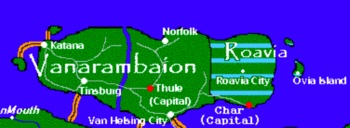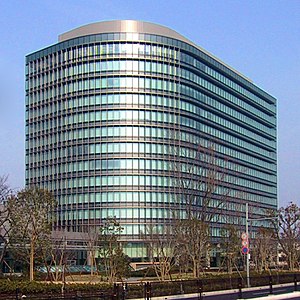Vanarambaion
Holy Confederacy of Vanarambaion Vanarambaion | |
|---|---|
|
Flag | |
| Motto: If it doesn't kill me it'd better run pretty darn fast | |
 Map of Vanarambaion | |
| Capital | Thule |
| Largest | Tinsburg |
| Official languages | Vanarhoman |
| Recognised regional languages | Akiiryan |
| Ethnic groups | Barovian (13%) |
| Demonym(s) | Vanara |
| Government | Confederal monarchy |
• Emperor | Christoph Tinsman[1] |
• Heir apparent | Wallace Wilson |
| Legislature | Senate |
| Population | |
• 2005 census | 24,860,000 |
| Currency | Vanara Mark ($M) |
| Driving side | right |
The Holy Confederacy of Vanarambaion is a massive, economically powerful nation, renowned for its complete absence of social welfare. Its hard-nosed, hard-working, cynical population of 24.86 million are kept under strict control by the oppressive government, which measures its success by the nation's GDP and refers to individual citizens as "human resources."[2]
Geography
Vanarambaion is a primarily temperate island nation. Mild summers and colder than average winters are a result of the rocky terrain of the island, most likely the remains of a long-extinct volcano. The rich black soil covering most of the island is one of the few saving graces of the island, and much of the land has been terraformed in recent memories to make room for agriculture and the expanding population. Two Vanarambaion colonies exist on the surrounding mainlands, as the island on which the nation is found is not far from larger landmasses on three sides. These lands have been similarly reformed in the same manner as the mainland, but lack the rich soil of the homeland. There are also two smaller islands claimed by Vanarambaion rather farther to the south of the mainland, and utilized by the government exclusively as military installations. Vanarambaion has long staked territorial maritime claims of 100 nautical miles or out to 15 nautical miles from the mainland, whichever is shorter. This was a relatively recent concession, and was part of a treaty to end hostilities with Tagmatium - previously Vanarambaion had claimed maritime rights up to 10 miles off the mainland. In reality, the only portion of the nautical border that utilizes the 100-mile rule is the northern border, where the mainland ends and the sea lanes open clear to the Arctic Circle.[3]
- Vanarambaion's island is shared by another nation, and the two nations conscientiously ignore each other.
- Administrative Division: Ancient States of Vanarambaion, Roavia, North Vanarambaion, Vykos Island, Upas Island
- Provinces/Territories: 3 counties, divided into townships.
History
Vanarambaion is kind of an anomaly in a way. Stuck on an island, they've been defending against attacks from the mainland for as long as they can remember.[4] The Vanara lived in these areas from the time of the 3rd millennium BCE. In the 9th century BCE, the island was the centre of the Baianili kingdom. The region came under the control of the Aroman Empire in the 2nd century BCE and became a major Aroman population centre. It became a part of the Akiiryan sphere of influence during their century-long wars with their neighbouring Aroman arch-rivals. The area continued to be contested for many centuries afterwards. This has led to a very in-turned country that tries to systematically remove itself from foreign influences of all kinds. However, there has been a rash of liberal Emperors who have opened Vanarambaion up to the outside, starting around 1880.
Politics
Due to the opening of the country, Vanarambaion is going through a period of intense growth, and the height of power for the anti-Emperor faction in the Vanarambaion Senate. This being said, the Emperor still has an iron grip on foreign policy.
Monarchy
The current Emperor is Wallace Wilson, an idealist liberal who is looking for ways to write himself into the history books without marching off to war. He's very religious and believes himself to be a latter-day prophet. The Europtimans have fought Vanarambaion in the past, but have been quietly lobbying for independence for about a hundred years while keeping their military intact. Long Title: His Imperial Majesty, Bishop of Thule, Vicar of the Synod, Successor of Richard, Prince of the Apostles, Supreme Pontiff, Patriarch of the South, Archbishop and Metropolitan of the Aroman Province, Servant of the Vanarambaion Masses, and Imperator.
Military
The military numbers are low - just enough to deal with the Europtiman rebels effectively, should the need arise - as most of the military was disbanded to allow for improvements in the military technology following the opening of the country. Vanarambaion relies mostly on the draft in wartime. New technology is being furiously researched to put Vanarambaion on an even keel with the rest of the civilized world.
Economy
Vanarambaion's citizens demand an isolationist, anti-imperialist policy based on their long history of getting involved in foreign affairs just to be invaded. This being said, the untapped potential of the Vanarambaion agriculture and military capabilities is astronomical. Vanarambaion declares neutrality at the beginning of the civil war and resolves to trade with both sides and any other countries involving themselves in the war. They don't seem to realize that trade is an evil that could bring them into the war. On the other hand, having a neutral party could potentially lead to less bloodshed. It's all about who plays the cards.
In the modern era, Vanarambaion's influence in the world economy was minimal until roughly 30 years ago. At that time, economic reforms initiated by the late Emperor Van Bricius began to generate significant and steady growth in investment, consumption and standards of living. Vanarambaion now participates extensively in the world market and private sector companies play a major role in the economy. Millions of citizens have been lifted out of poverty: According to The Holy Confederacy's official statistics, the poverty rate fell from 53% 31 years ago to 2.5% six years ago. The infant mortality rate fell by 39.5% between in the last 20 years and maternal mortality by 41.1%.
Vanarambaion has generally implemented reforms in a gradualist fashion, a product of its status as a true confederacy. As its role in world trade has steadily grown, its importance to the international economy has also increased apace. Vanarambaion's growth comes both from huge state investment in infrastructure and heavy industry and from private sector expansion in light industry instead of just exports. The massive and heavily concentrated public sector, dominated by large SOEs, provided key inputs from utilities, heavy industries, and energy resources that facilitated private sector growth and drove investment, the foundation of national growth.
The government's decision to permit Vanarambaion to be used by multinational corporations as an export platform has made the country a major competitor to other export-led economies in the area. Vanarambaion has emphasized raising personal income and consumption and introducing new management systems to help increase productivity. The government has also focused on foreign trade as a major vehicle for economic growth. The restructuring of the economy and resulting efficiency gains have contributed to a more than tenfold increase in GDP in the last 30 years.
The two most important sectors of the economy have traditionally been military and industry, which together employ more than 70 percent of the labor force and produce more than 60 percent of GDP. The two sectors have differed in many respects. Technology, labor productivity, and incomes have advanced much more rapidly in the military sector than in industry. The disparities between the two sectors have combined to form an economic-cultural-social gap between the career military and everyone else, which is a major division in Chinese society, although this has been lessened in recent years with the institution of two years of compulsory military service for all able-bodied males. Vanarambaion exports a significant amount of military equipment, as well as foods and raw materials.
Despite the relatively positive outlook for its economy, Vanarambaion faces a number of difficult challenges that, if not addressed, could undermine its future economic growth and stability. These include pervasive government corruption, an inefficient banking system, over-dependence on exports and fixed investment for growth, the lack of rule of law, pollution, and widening income disparities. Overall, though, these are minor problems, and the juggernaut of a Vanarambaion economy looks to roll on for decades to come.[3]
Demographics
- The majority of the nation's population is Vanara, and has a sizeable 13% Akiiryan minority (Barovian) on the east coast.
- The official language is Vanarhoman (87%), with Akiiryan (13%) widely spoken by the Barovians. Anglish is only spoken by high-ranking officials.
- The official religion is the Church of Vanarambaion (single deity, modified Catholicism)
- Median Age: 32.7
- Population Growth Rate: 4.2%
- Literacy: 37%
References
- ↑ The Mighty Leaders Of Europa: Christoph Tinsman (2 March 2006)
- ↑ NSWiki archive: Vanarambaion (13 April 2005)
- ↑ Jump up to: 3.0 3.1 Vanarambaion Factbook (nationstates.net)
- ↑ The Holy Confederacy of Vanarambaion (21 March 2005)



